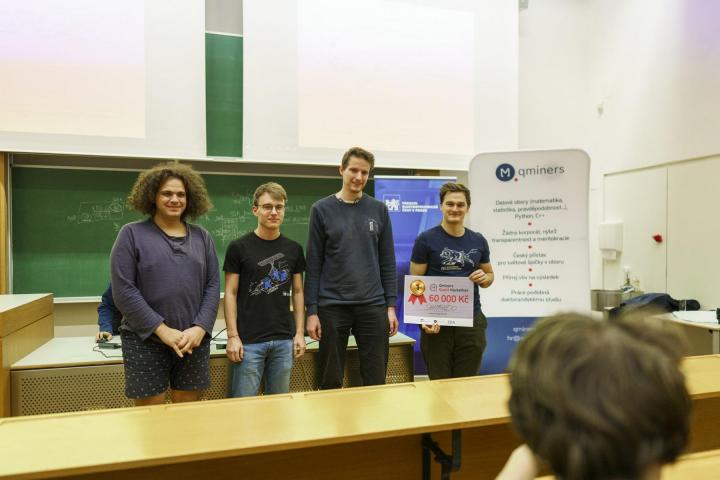List of winners
- prize (60 000 CZK) – Shimando team (CTU FEL)
- prize (30 000 CZK) – Greenhorns team (Faculty of Mathematics and Physics, Charles University)
- prize (10 000 CZK) – Matfyzácká zmeska team (Faculty of Mathematics and Physics, Charles University)
Use algorithms against the hockey bookey
Contestants were tasked with designing a betting strategy using machine learning and winning against a virtual hockey bookmaker. The qualifying phase of the competition, which preceded the finals and lasted less than a month, was crucial. During this period, students had validation data on which to test the development of predictive models. They were then able to test which investment strategy worked best based on the gains they received.
The best solution? The simplest one!
In the final round, the teams received new data. At this point, the betting was on. Twice during the day-long programming competition, students gained insight into their results and comparisons with others so they could consider changing their strategy if necessary. Captain Šimon Mandlík explained the winning strategy: "We had a variety of strategies. It was nice that we were given a similar but not exactly the same problem as a qualification, on which we could try different solutions. In the end, the Occam's razor principle proved to be the best and one of the simplest solutions turned out to be the best in the final," said Mandlík. "It was a combination of a special ordering of the teams by performance inspired by the ELO system from chess and also a careful study of the way the bookmaker wrote the bets," the captain explained the difficult path to victory.
The composition of the winning team Shimando was determined by the acquaintance during the study at the CTU Faculty of Engineering. Captain Šimon Mandlík, who is a graduate of the OI and a current PhD student at the Department of Computers, invited Václav Voráček (a graduate of the OI who is studying for his PhD at the University of Tübingen, Germany), Vojtěch Čermák (a graduate of MatFyz and a current PhD student at the Department of Computers) and Martin Rektoris (a master's student in the KyR program) to join the team. They are already clear about how they will use the 60,000 CZK prize. "We are going to bet using our algorithm on the ongoing World Cup," Mandlík revealed with a bit of exaggeration.
Algotrading in science and practice
The competition brief was created by researchers from the Intelligent Data Analytics (IDA) group together with Qminers. They are working on algorithmic stock trading (algotrading), so students could try out principles that are commonly applied in practice in the hackathon. According to the organisers, the growing trend of automated trading using machine learning algorithms is the reason for such a large student participation in the competition. "I am delighted that there is such interest in this programming challenge. The topic is attractive for both researchers and students, so it is good that they get to see it through the competition," said researcher Gustav Šír from the IDA group, who is behind the development of the game system together with his colleagues Ondřej Hubáček and Matej Uhrín.
"Organizing the competition makes sense to us because we get to meet smart students who we can get excited about what we do," added Martina Zátopková from Qminers. At the hackathon, she also praises the friendly atmosphere that prevailed throughout the day. "I consider the informal part after the competition, when students shared their experiences and impressions with each other, to be very successful. Networking is very important for young people and I am glad that we made it possible for the students," Zátopková sums up the benefits of the event.
IT was the second year of the Qminers Quant Hackathon. Both parties plan to continue the organization in the coming years. Students can find more information on the hackathon website.
